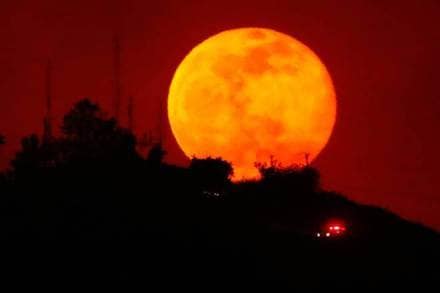A total lunar eclipse will grace the skies on January 20-21 night. The cosmic event occurs when Sun, Earth and Moon are aligned with Earth between the other two.
This lunar eclipse will a total lunar eclipse which is also called super blood moon or Wolf Moon or Super Blood Wolf Moon. This is because of the phenomenon whereby the Moon, which revolves around the Earth, appears reddish in colour.
To be more clear, a Chandra grahan or lunar eclipse takes place when the moon lines behind the Earth and Earth’s shadow which occurs during the course of event covers the Moon. This celestial event happens only on the night of a full moon.
This year, however, it is the Super Blood Wolf Moon which is scheduled to occur on January 20 and 21 and here’s why this year is different. Super Blood Wolf Moon Lunar Eclipse is the celestial event when moon, earth and sun line up perfectly in a straight line with earth in the middle.
Total lunar eclipse will be making the moon appear reddish in colour which is why it is known as a blood moon. The moon does not goes completely dark in the total lunar eclipse. Instead, the moon has on a reddish glow from refracted light as planets move into their position which is how this event gets the nickname – the “blood moon”. It is important to note that the more particulate or pollution in the atmosphere, the redder the moon will appear.
Supermoon
In addition, the moon will be closer to the Earth than normal and also appear bigger and brighter than usual which is called a supermoon.
Super blood wolf moon
The full moon in January is also sometimes traditionally known as the wolf moon as the the howling of wolves was a sound that determined the winter and therefore it is the super blood wolf moon this year.
How to see Super Blood Wolf Moon:
January will mark the first lunar eclipse of 2019 on 20th and this will also be the last total lunar eclipse until 2021.
“We’re going into this unusual lull in total lunar eclipses over the next couple of years,” Tom Kerss, an astronomer from the Royal Observatory Greenwich told the Guardian.
So, if the skies are clear, you can spend a lovely night stargazing.
READ ALSO | ‘Super Wolf Blood Moon’ Total Lunar Eclipse on January 20-21, 2019: Here is how you can watch it!
Lunar eclipse timing
The total lunar eclipse will begin at 11:41 pm ET on January 20, which is around 10:11 am on January 21, which is Monday in India.
The total event will last for nearly three-and-a-half hours, reports say.
